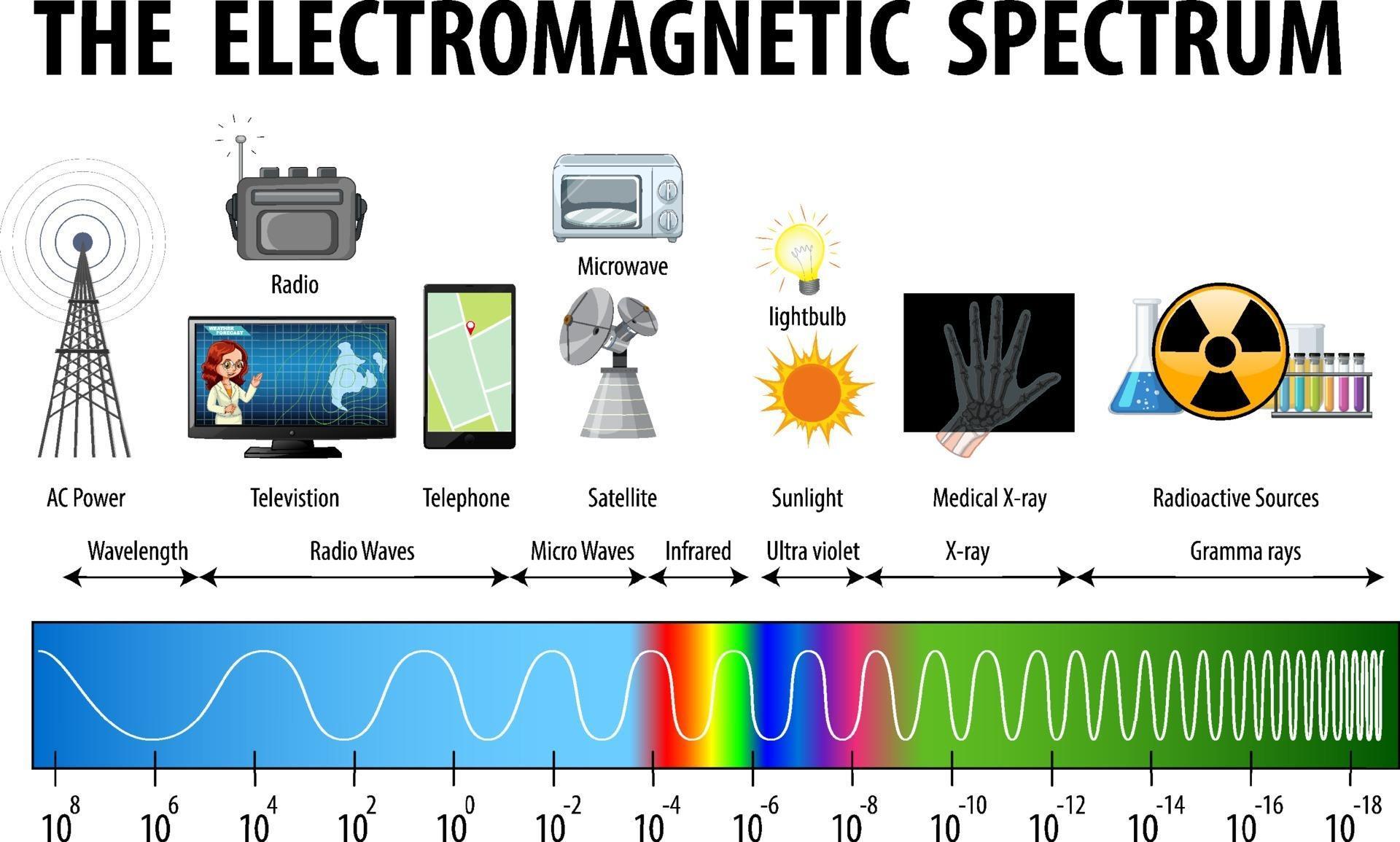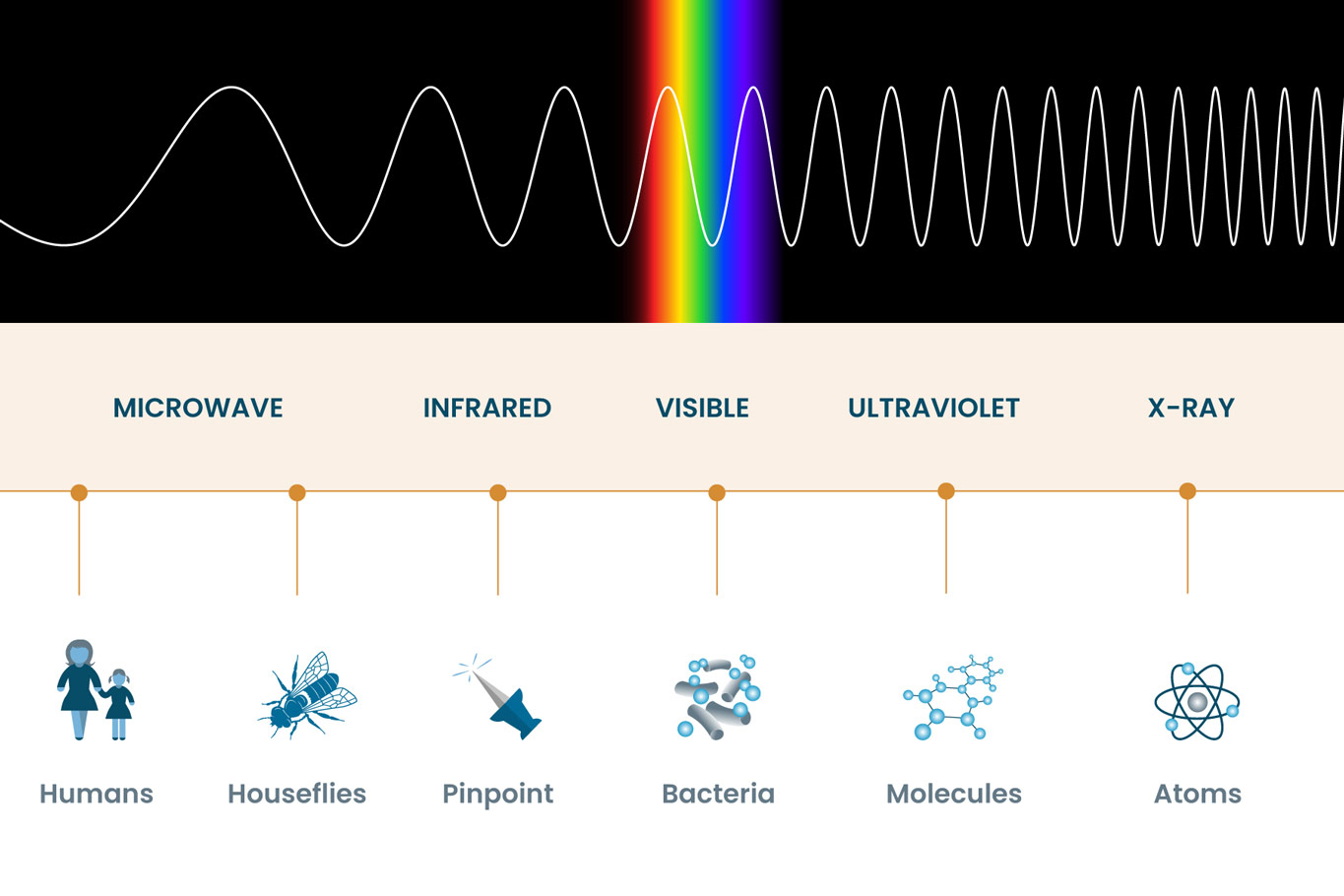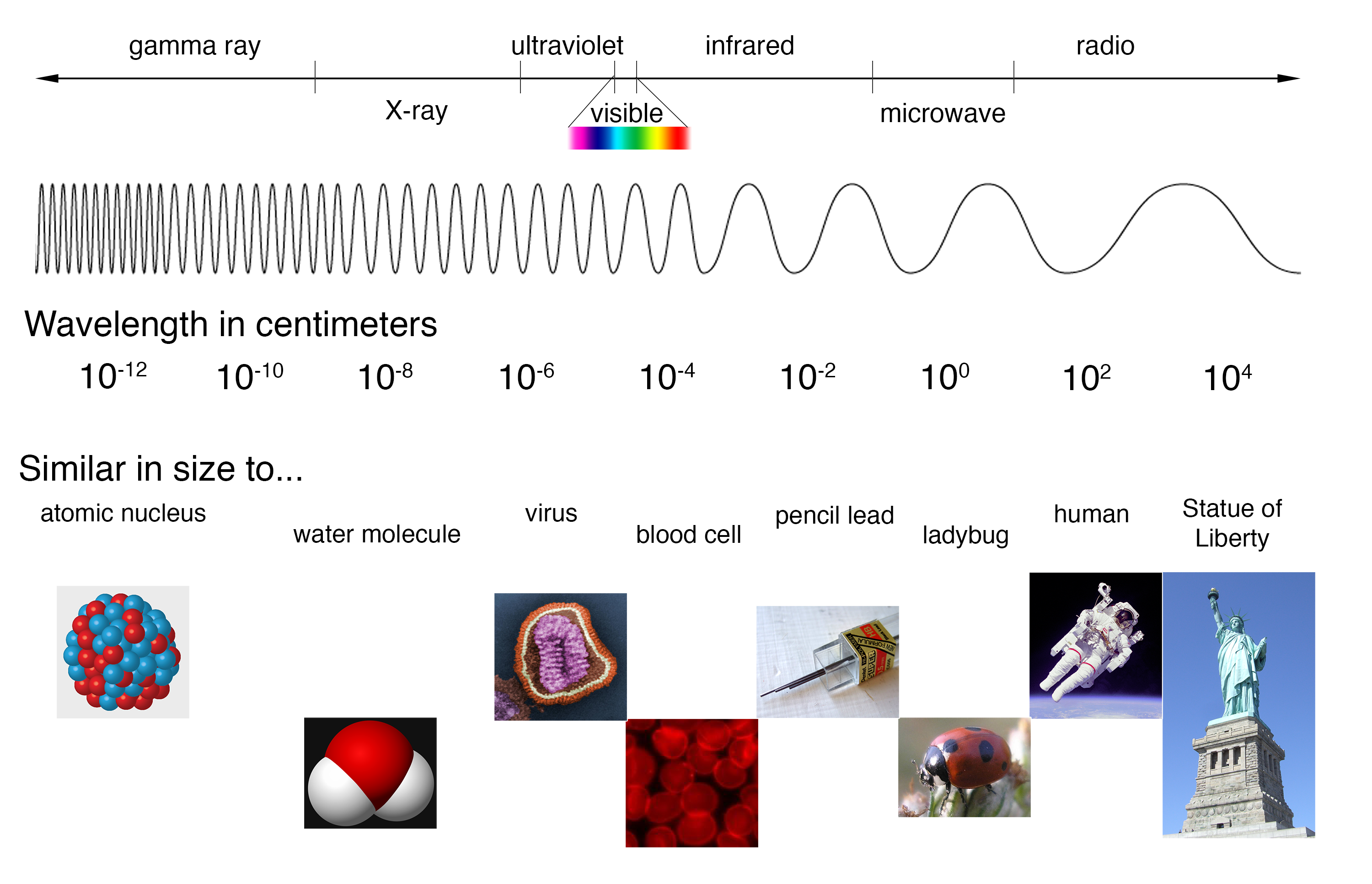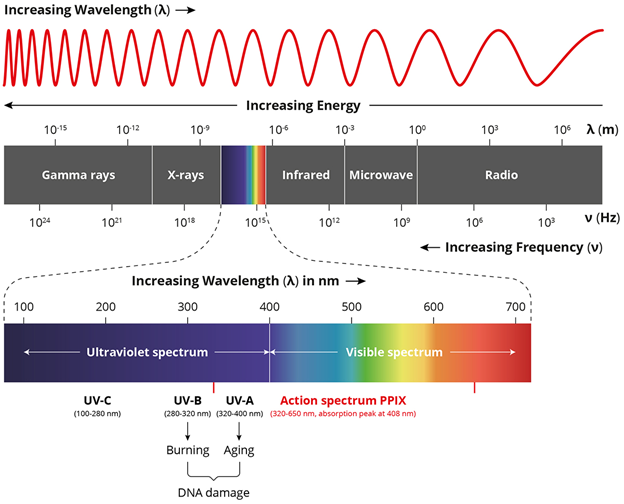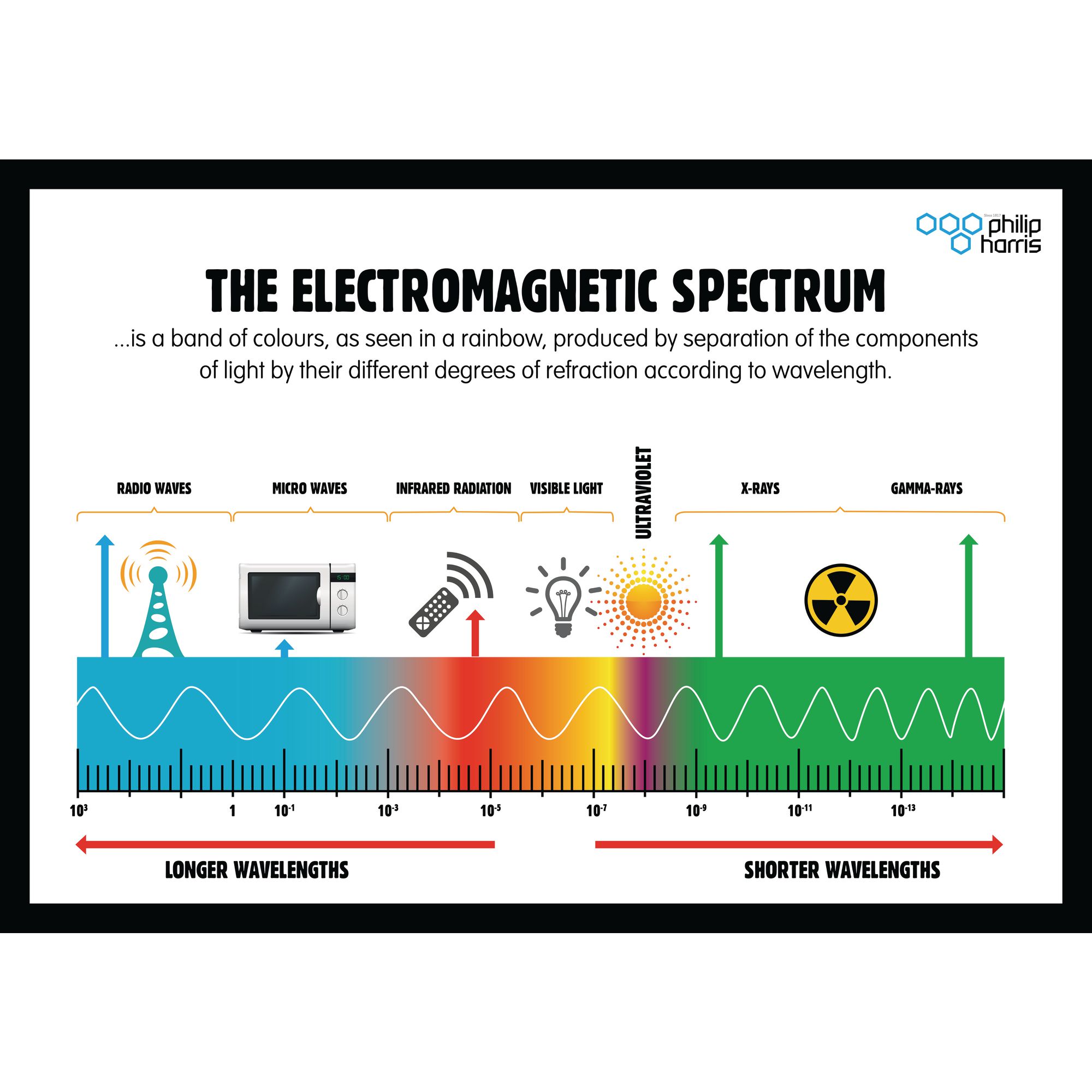Electromagnetic Spectrum Drawing
Electromagnetic Spectrum Drawing - This means as you look from left to right on a diagram of the spectrum, the wavelengths get smaller and the frequency gets larger. Shorter wavelengths with higher frequencies make up the optical spectrum. Shorter wavelengths with higher frequencies make up the optical spectrum. Electromagnetic energy travels in waves and spans a broad spectrum from very long radio waves to very short gamma rays. Web draw a simplified electromagnetic spectrum, indicating the relative positions, frequencies, and spacing of the different types of radiation bands.
The following table shows us this spectrum, which consists of all the types of electromagnetic radiation that exist in our universe. Web the microwave and infrared regions of the electromagnetic spectrum overlap (figure 24.3.1 ). There is a wide range of subcategories contained within radio including am and fm radio. In this module we examine how electromagnetic waves are classified into categories such as radio, infrared, ultraviolet, and so on, so that we can understand some of their similarities as. The lowest frequency portion of the electromagnetic spectrum is designated as “radio,” generally considered to have wavelengths within 1 millimeter to 100 kilometers or frequencies within 300 ghz to 3 khz. Electromagnetic energy travels in waves and spans a broad spectrum from very long radio waves to very short gamma rays. Describe and explain the differences and similarities of each section of the electromagnetic spectrum and the applications of radiation from those sections
Understanding how to understand the Spectrum Telegraph
The colored inset shows the visible spectrum. Web the electromagnetic spectrum is a range of frequencies, wavelengths and photon energies covering frequencies from below 1 hertz to above 10 25 hz, corresponding to wavelengths which are a few kilometres to a fraction of the size of an atomic nucleus in the spectrum of electromagnetic waves..
Finding out how to understand the particular Spectrum
Web put a ruler across the middle of the paper (landscape style) and trace each side of the ruler so that you have two lines going across your paper. Web the microwave and infrared regions of the electromagnetic spectrum overlap (figure 24.3.1 ). Web draw a simplified electromagnetic spectrum, indicating the relative positions, frequencies, and.
Learning the Spectrum Telegraph
List and explain the different methods by which electromagnetic waves are produced across the spectrum. The em spectrum is a range of frequencies that corresponds to all different forms of electromagnetic radiation in the universe. Electronic transitions in atoms and molecules can also produce infrared radiation. There is a wide range of subcategories contained within.
Spectra Introduction
Fold your paper like this ( ( ( Shorter wavelengths with higher frequencies make up the optical spectrum. There is a wide range of subcategories contained within radio including am and fm radio. The electromagnetic spectrum showing the boundaries between different regions and the type of atomic or molecular transition responsible for the change in.
Science Spectrum diagram. 1868617 Vector Art at Vecteezy
The electromagnetic spectrum showing the boundaries between different regions and the type of atomic or molecular transition responsible for the change in energy. The em spectrum is a range of frequencies that corresponds to all different forms of electromagnetic radiation in the universe. Web the microwave and infrared regions of the electromagnetic spectrum overlap (figure.
Science spectrum diagram Vector Image
In the first section, write electromagnetic spectrum. The spectrum is divided into separate bands, with different names for the electromagnetic waves within each band. The human eye can only detect only a small portion of this spectrum called visible light. Web electromagnetic spectrum, the entire distribution of electromagnetic radiation according to frequency or wavelength. Describe.
spectrum diagram Royalty Free Vector Image
Electronic transitions in atoms and molecules can also produce infrared radiation. Each type has its own section. Web the electromagnetic spectrum is a collection of frequencies, wavelengths, and photon energies of electromagnetic waves spanning from 1hz to 10 25 hz, equivalent to wavelengths ranging from a few hundred kilometres to a size smaller than the.
Spectrum Definition, Characteristics, Range, Diagram
Visible light radiation that comes from a lamp in someone’s house or radio wave radiation that comes from a radio station are two types of electromagnetic radiation. Web draw a simplified electromagnetic spectrum, indicating the relative positions, frequencies, and spacing of the different types of radiation bands. Longer wavelengths with lower frequencies make up the.
Understanding the Spectrum Telegraph
Each type has its own section. You will create your own electromagnetic spectrum (you can use your textbook as a guide). List and explain the different methods by which electromagnetic waves are produced across the spectrum. Web define the electromagnetic spectrum, and describe it in terms of frequencies and wavelengths; Web the electromagnetic (em) spectrum.
2.A. spectrum. Two main characteristics of
Web the electromagnetic spectrum is a collection of frequencies, wavelengths, and photon energies of electromagnetic waves spanning from 1hz to 10 25 hz, equivalent to wavelengths ranging from a few hundred kilometres to a size smaller than the size of an atomic nucleus. There is a wide range of subcategories contained within radio including am.
Electromagnetic Spectrum Drawing Infrared radiation is generally produced by thermal motion and the vibration and rotation of atoms and molecules. Visible light radiation that comes from a lamp in someone’s house or radio wave radiation that comes from a radio station are two types of electromagnetic radiation. Web electromagnetic waves can be classified and arranged according to their various wavelengths/frequencies; Understand the electromagnetic spectrum, including different regions from visible light to gamma rays and their uses. Web the electromagnetic spectrum is a collection of frequencies, wavelengths, and photon energies of electromagnetic waves spanning from 1hz to 10 25 hz, equivalent to wavelengths ranging from a few hundred kilometres to a size smaller than the size of an atomic nucleus.
Electromagnetic Radiation Is Energy That Spreads Out As It Travels.
Web what is the electromagnetic spectrum? Web the electromagnetic (em) spectrum is the range of all types of em radiation. This means as you look from left to right on a diagram of the spectrum, the wavelengths get smaller and the frequency gets larger. The electromagnetic spectrum showing the boundaries between different regions and the type of atomic or molecular transition responsible for the change in energy.
Shorter Wavelengths With Higher Frequencies Make Up The Optical Spectrum.
Web define the electromagnetic spectrum, and describe it in terms of frequencies and wavelengths; The human eye can only detect only a small portion of this spectrum called visible light. The spectrum is divided into separate bands, with different names for the electromagnetic waves within each band. Visible light radiation that comes from a lamp in someone’s house or radio wave radiation that comes from a radio station are two types of electromagnetic radiation.
The Lowest Frequency Portion Of The Electromagnetic Spectrum Is Designated As “Radio,” Generally Considered To Have Wavelengths Within 1 Millimeter To 100 Kilometers Or Frequencies Within 300 Ghz To 3 Khz.
Web the electromagnetic spectrum (the following lecture material aligns with the slides.) the em spectrum is the complete (entire) range of em waves in order of increasing frequency and decreasing wavelength. Longer wavelengths with lower frequencies make up the radio spectrum. Web the electromagnetic spectrum is comprised of all frequencies of electromagnetic radiation that propagate energy and travel through space in the form of waves. You must include all parts of the electromagnetic spectrum (waves, frequency, wavelength, and a drawing that describes each wave).
In This Module We Examine How Electromagnetic Waves Are Classified Into Categories Such As Radio, Infrared, Ultraviolet, And So On, So That We Can Understand Some Of Their Similarities As.
Web electromagnetic spectrum, the entire distribution of electromagnetic radiation according to frequency or wavelength. Electromagnetic energy travels in waves and spans a broad spectrum from very long radio waves to very short gamma rays. Shorter wavelengths with higher frequencies make up the optical spectrum. Longer wavelengths with lower frequencies make up the radio spectrum.

